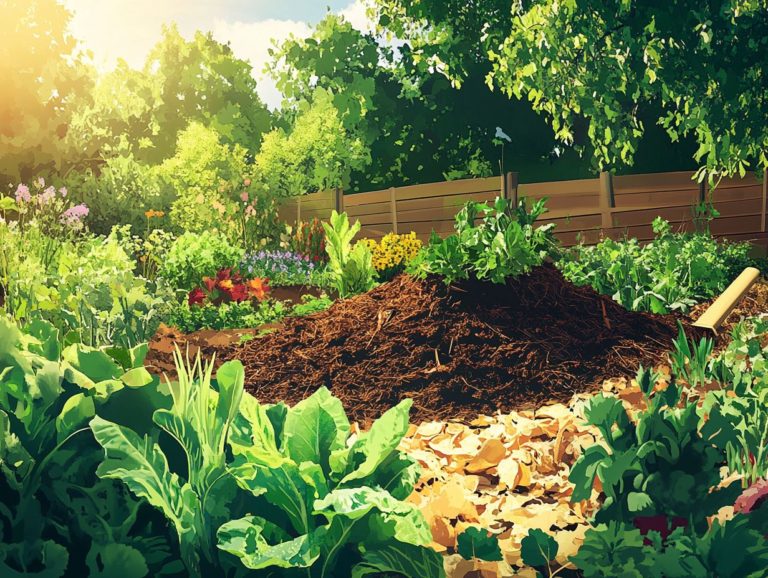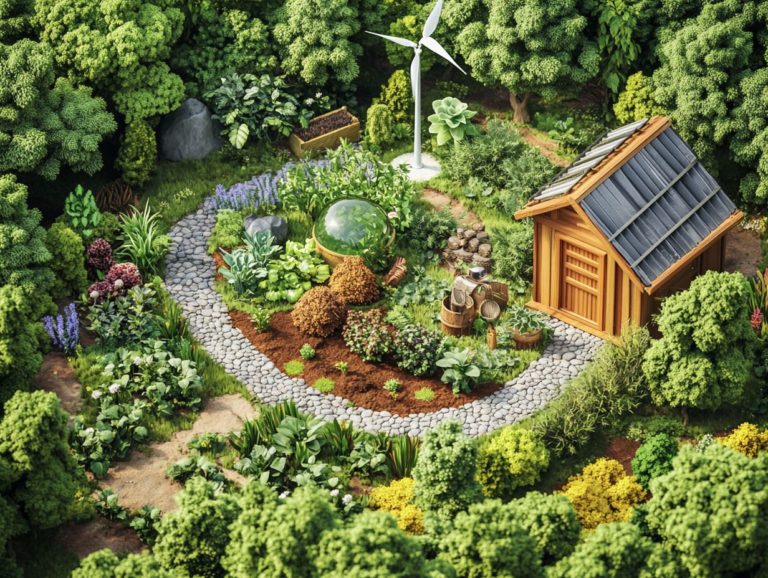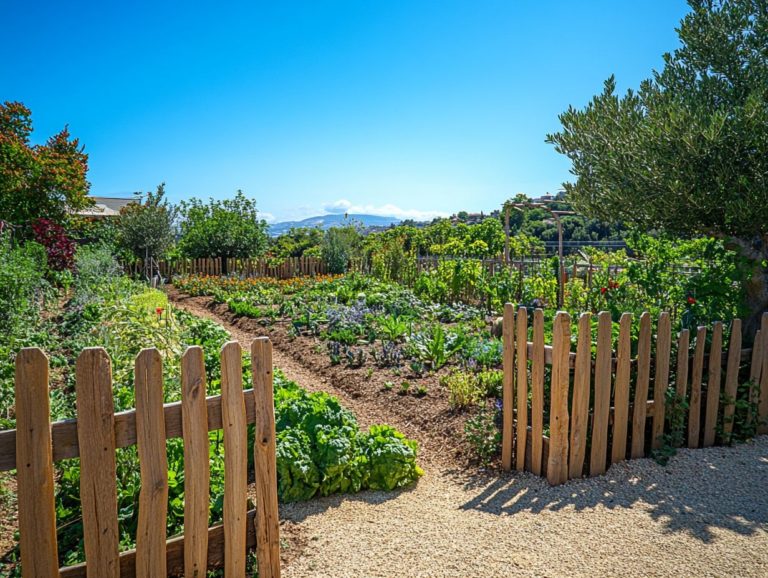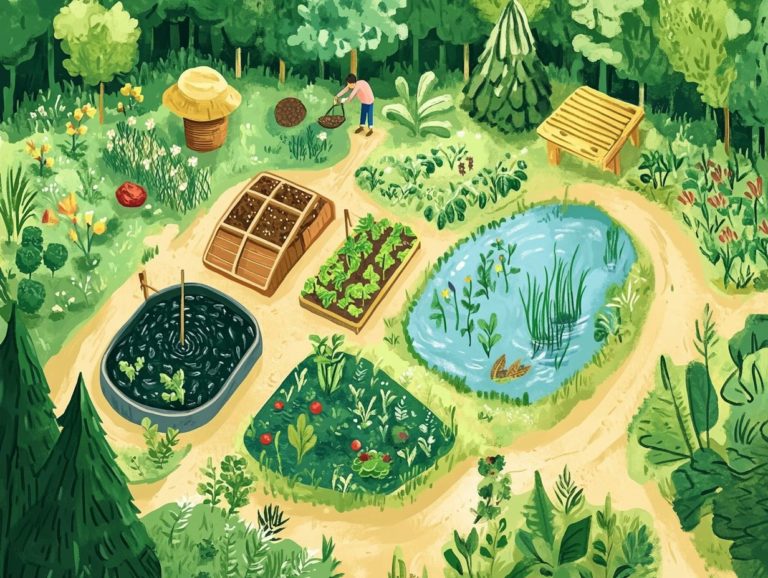Exploring the Role of Community Gardens
Community gardens, such as those supported by the Pennsylvania Horticultural Society, are vibrant sanctuaries that cultivate connection. These gardens contribute to both the ability to maintain healthy environments and community resilience, creating lasting impacts on urban life.
In engaging with local communities, these gardens create opportunities to connect with nature and foster environmental awareness. They transcend mere patches of greenery; they emerge as vibrant sanctuaries that cultivate sustainability and resilience within neighborhoods.
Discover why community gardens are vital to our neighborhoods! From the environmental and social benefits they offer to practical avenues for involvement, you’ll gain insights into the challenges these gardens encounter and effective strategies for overcoming them.
Uncover the essential role community gardens play in enriching urban life, and see how they can transform your surroundings.
Contents
- Key Takeaways:
- The Definition and Purpose of Community Gardens
- Benefits of Community Gardens
- How to Get Involved in Community Gardens
- Challenges and Solutions for Community Gardens
- Frequently Asked Questions
- What is the role of community gardens in a community?
- How do community gardens benefit individuals and families?
- What environmental benefits do community gardens offer?
- How can community gardens promote education and learning?
- How can individuals get involved with community gardens?
- Do community gardens have a positive impact on local economies?
Key Takeaways:
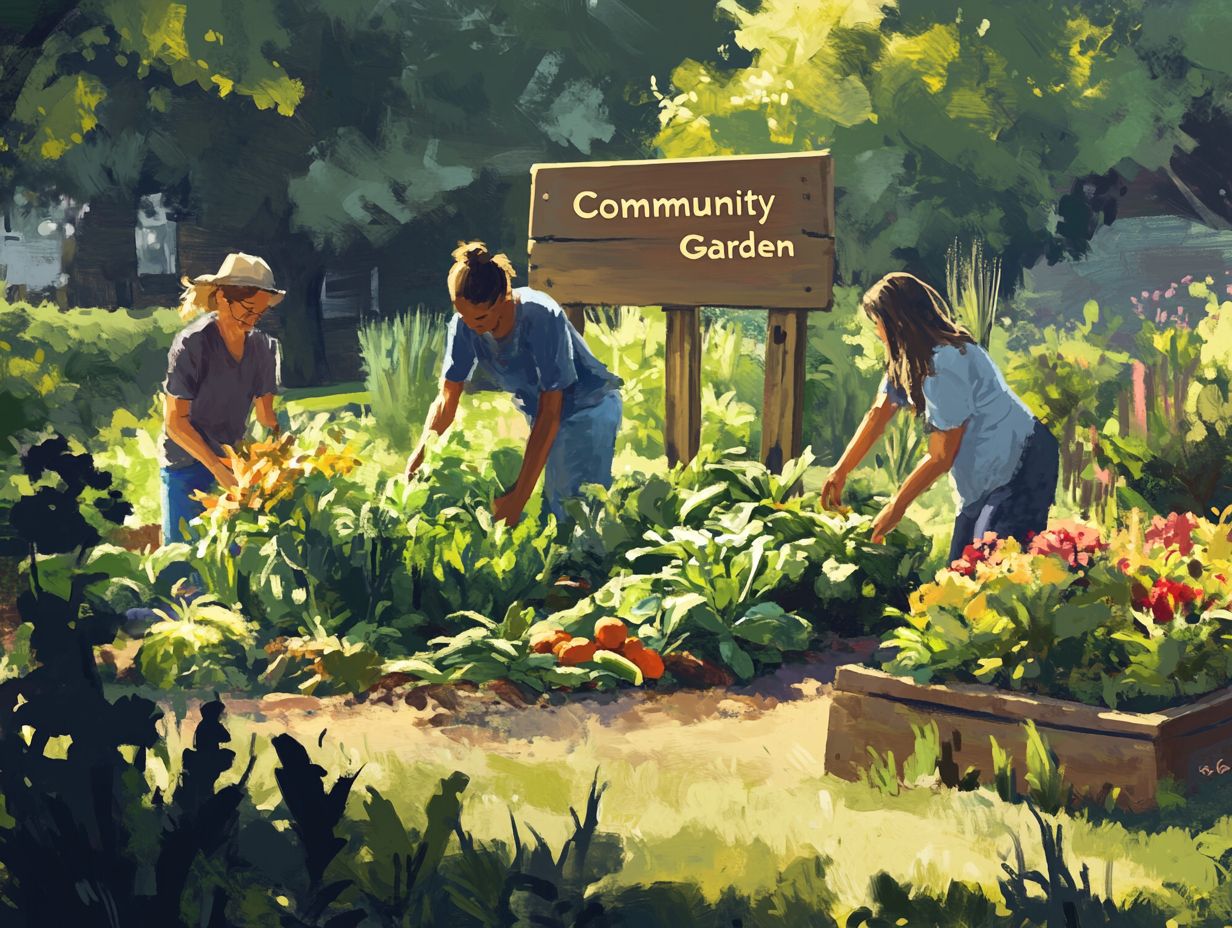
The Definition and Purpose of Community Gardens
Community gardens are vibrant plots of land nurtured by local residents, offering a unique space for local farming projects that help communities grow food while championing sustainable gardening practices. These gardens are crucial for food security, social connections, and neighborhood resilience elements vital for the well-being of local neighborhoods.
They significantly contribute to environmental sustainability through eco-friendly practices that enrich urban spaces, all while creating opportunities for social connection within neighborhoods.
They stand as essential community hubs, transforming urban landscapes by fostering meaningful connections between local citizens and the natural world.
What are Community Gardens?
Community gardens are safe spaces in cities where people cultivate plants together, sharing resources and engaging in gardening practices that promote a healthier lifestyle.
These gardens often feature various structures, such as raised beds, individual or group plots, and communal spaces designed for gatherings and educational activities. You might encounter different types of community gardens, including:
- Vegetable patches
- Flower gardens
- Therapeutic spaces that enhance mental health through social cohesion and well-being
Typically, these gardens are managed by a blend of local nonprofits, neighborhood associations, and dedicated volunteers, making them essential hubs for connection. By bridging gaps between residents, community gardens elevate neighborhood interactions while nurturing a profound appreciation for nature, allowing you and your fellow community members to reconnect with the earth in a truly meaningful way.
Why are They Important?
The importance of community gardens is clear when you consider their many benefits to food security. These gardens act as vibrant hubs where you and your neighbors can cultivate not only vegetables but also social bonding and community pride.
These gardens also encourage physical activity while fostering relationships among local citizens through gardening. Take urban areas like Detroit, for instance; here, community gardens have become essential sources of fresh organic produce, providing residents with healthier food options.
In places like California, similar initiatives connect these gardens to educational programs that promote knowledge about nutrition and sustainability among families. By engaging a diverse array of individuals, these vibrant ecosystems enhance social cohesion, allowing neighbors to collaborate, share resources, and learn from one another. This collaboration significantly enriches the local community fabric, making it all the more vibrant and resilient.
Benefits of Community Gardens
Community gardens offer amazing benefits that impact our environment, society, and economy! They play a crucial role in enhancing the development and well-being of local communities, enriching lives in more ways than one.
Environmental Benefits
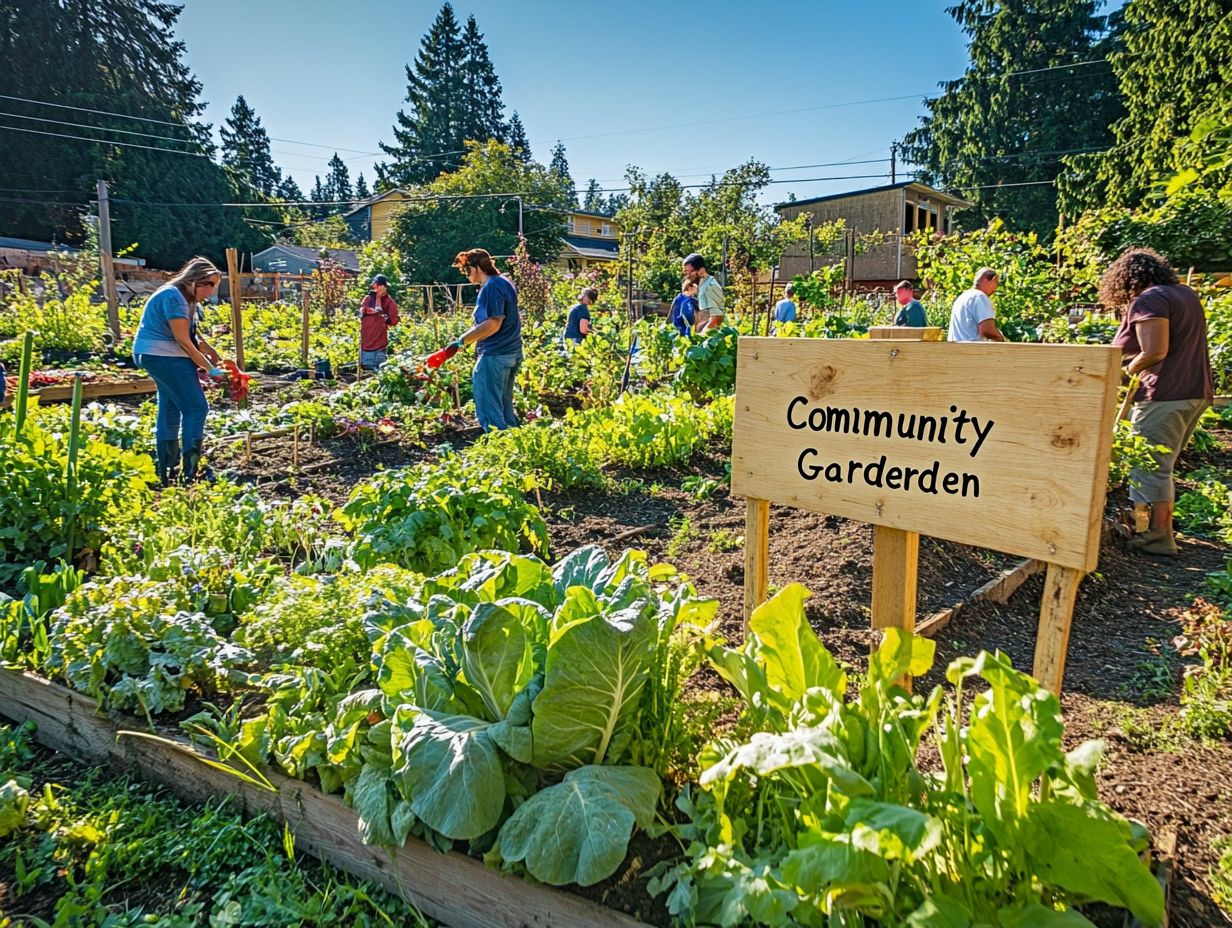
Community gardens play a pivotal role in enhancing environmental sustainability by transforming urban spaces into lush green havens, encouraging biodiversity and boosting food production through organic practices.
These vibrant ecosystems significantly improve air quality by filtering out pollutants and generating oxygen. Community gardens attract diverse plants and animals, supporting local wildlife and pollinators, which are crucial for healthy ecosystems.
By adopting sustainable gardening practices like composting (recycling organic waste into nutrient-rich soil) and rainwater harvesting (collecting rainwater for irrigation), you can enhance soil health and reduce water consumption. These gardens act as vital community hubs, helping to combat the urban heat island effect, which is when cities become hotter than surrounding areas due to human activities, by cooling temperatures and offering shaded areas.
In nurturing environments that support both plant and animal life, community gardens do more than beautify neighborhoods; they foster a deeper connection with nature for everyone involved.
Social and Community Benefits
The social and community benefits of community gardens are truly remarkable. They foster social cohesion, enhance mental health, and create opportunities for valuable community programs. Joining an existing community garden invites you to immerse yourself in volunteer engagement.
These vibrant spaces have the power to transform neighborhoods, serving as venues for educational workshops where you can learn about sustainable gardening practices or even participate in cooking classes that showcase healthy food options. Community gardens invite you to engage in volunteer efforts, bringing together diverse groups as you work side by side toward a common goal.
This collaboration not only strengthens interactions within the neighborhood but also supports local charities that often depend on these initiatives for sustainability. Ultimately, the positive impact of these gardens extends to boosting self-esteem as you cultivate new skills and take pride in your contributions to a collective effort that nourishes both body and spirit.
Join a community garden today and be a part of this vibrant movement!
How to Get Involved in Community Gardens
Engaging in community gardens presents a truly enriching experience for individuals within local communities. It offers a wealth of opportunities for volunteer involvement and hands-on gardening education, empowering community members to take ownership of their health and environment. You will grow not only plants but also valuable connections and skills.
Joining an Existing Garden
Joining an existing community garden invites you to immerse yourself in volunteer opportunities and adopt valuable gardening practices. You can contribute to local charities by sharing the bounty of your harvest.
This collaborative effort creates a sense of belonging within your neighborhood and cultivates sustainable gardening techniques that benefit everyone involved.
To embark on this journey, reach out to local community associations and neighborhood groups for insights about existing gardens. You can also inquire with local government offices overseeing such initiatives.
Engaging with these organizations opens doors to connect with experienced gardeners. You will learn and grow alongside them. The true enchantment of participating in a community garden unfolds through the shared experiences and friendships you cultivate, ultimately enhancing the spirit of togetherness.
Starting Your Own Garden
Starting your own community garden is an exciting journey! It requires thoughtful planning and a solid foundation in gardening education to create a vibrant space for local community members.
Begin by reaching out to your neighbors and engaging with local government entities to develop a shared vision. It’s crucial for community members to come together and identify a suitable location look for a spot that enjoys ample sunlight and access to water, as these elements are essential for sustainable gardening practices.
Don t underestimate the power of community associations; enlisting their help can significantly strengthen your network. Together, you can advocate for vital resources such as soil, seeds, and gardening tools.
Hosting workshops can help educate fellow community members about eco-friendly techniques. This transforms your garden into a thriving hub for learning and collaboration, making the community better for everyone.
Challenges and Solutions for Community Gardens
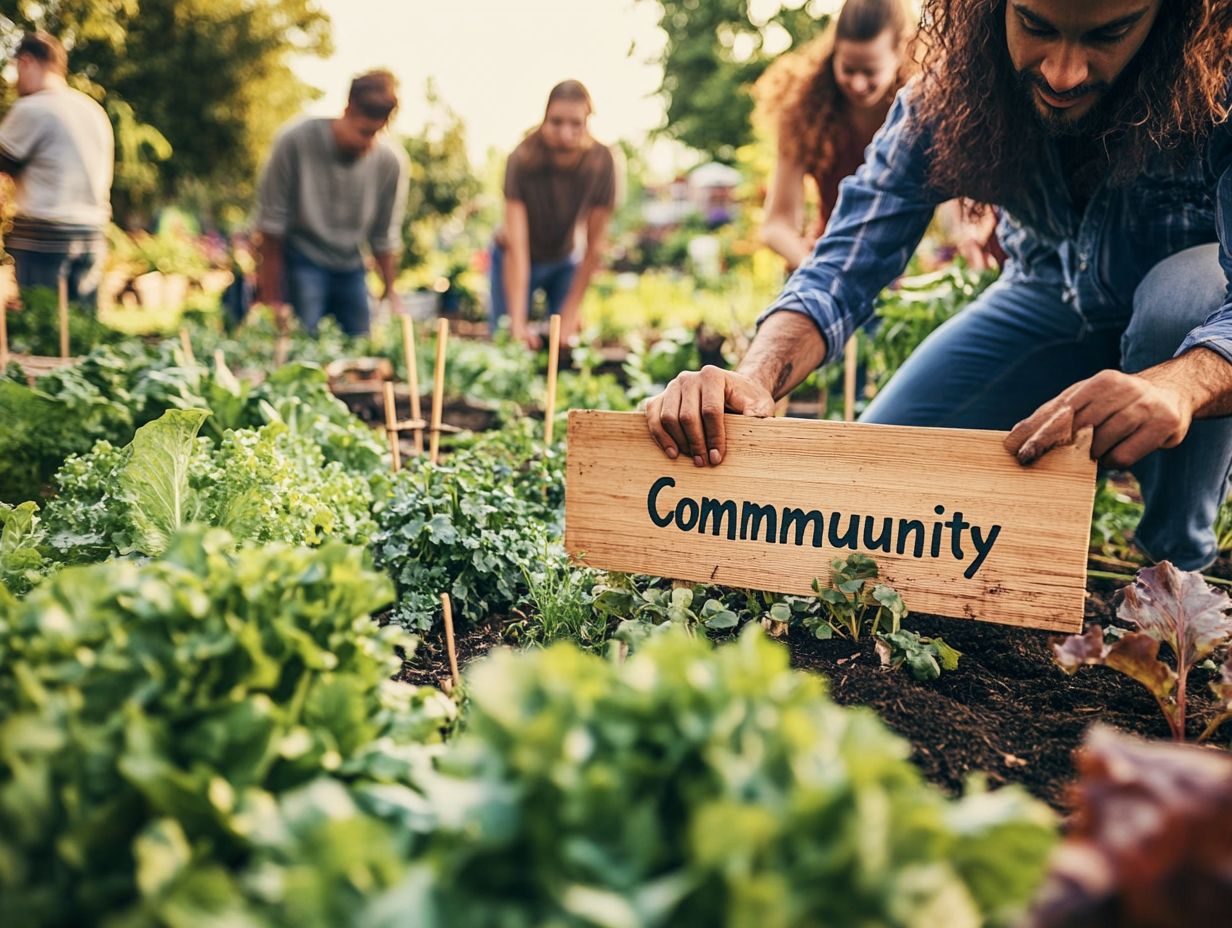
Community gardens encounter a range of challenges that can hinder their progress. However, with well-crafted solutions, you can ensure these gardens not only survive but flourish, delivering substantial benefits to the communities they serve.
Common Challenges Faced by Community Gardens
Community gardens often confront significant challenges, such as limited access to food resources, environmental concerns, and the complexities of working with local rules and laws. These gardens are crucial in tackling the food crisis, offering fresh produce and resources for local community members.
You may find that land access is a major hurdle; suitable plots can be scarce and often come with a maze of regulatory issues that complicate ownership or leasing. Securing funding for both the initial setup and ongoing maintenance can also be daunting.
Many organizers are left hunting for grants or donations, which can lead to inconsistent support that hampers progress. Maintenance problems can further complicate matters, as volunteers may not always be readily available, resulting in overgrown plots and wasted resources.
In the context of the current food crisis, these challenges are urgent and require our attention now. They underscore the critical need for sustainable practices that nurture resilience and foster community cohesion.
Potential Solutions and Resources
Improving community programs and access to gardening education can help tackle the challenges faced by community gardens. Collaborating with local government is essential for securing vital resources.
A wealth of existing resources and programs is available to boost community engagement and sustainable practices. Local organizations often provide grants specifically for community gardens, making it easier for groups to obtain funding for tools, seeds, and maintenance.
Educational workshops offer valuable insights into organic gardening, composting, and seasonal planting. These sessions help you develop essential gardening skills. Partnering with charities can bring extra support, fostering a sense of community and uniting volunteers to cultivate a vibrant neighborhood ecosystem.
By leveraging these resources, community gardens can thrive and become invaluable green spaces within urban landscapes.
Frequently Asked Questions
What is the role of community gardens in a community?
Community gardens unite us, boost sustainability, and give us fresh produce! They also serve as spaces for education and cultural exchange.
How do community gardens benefit individuals and families?
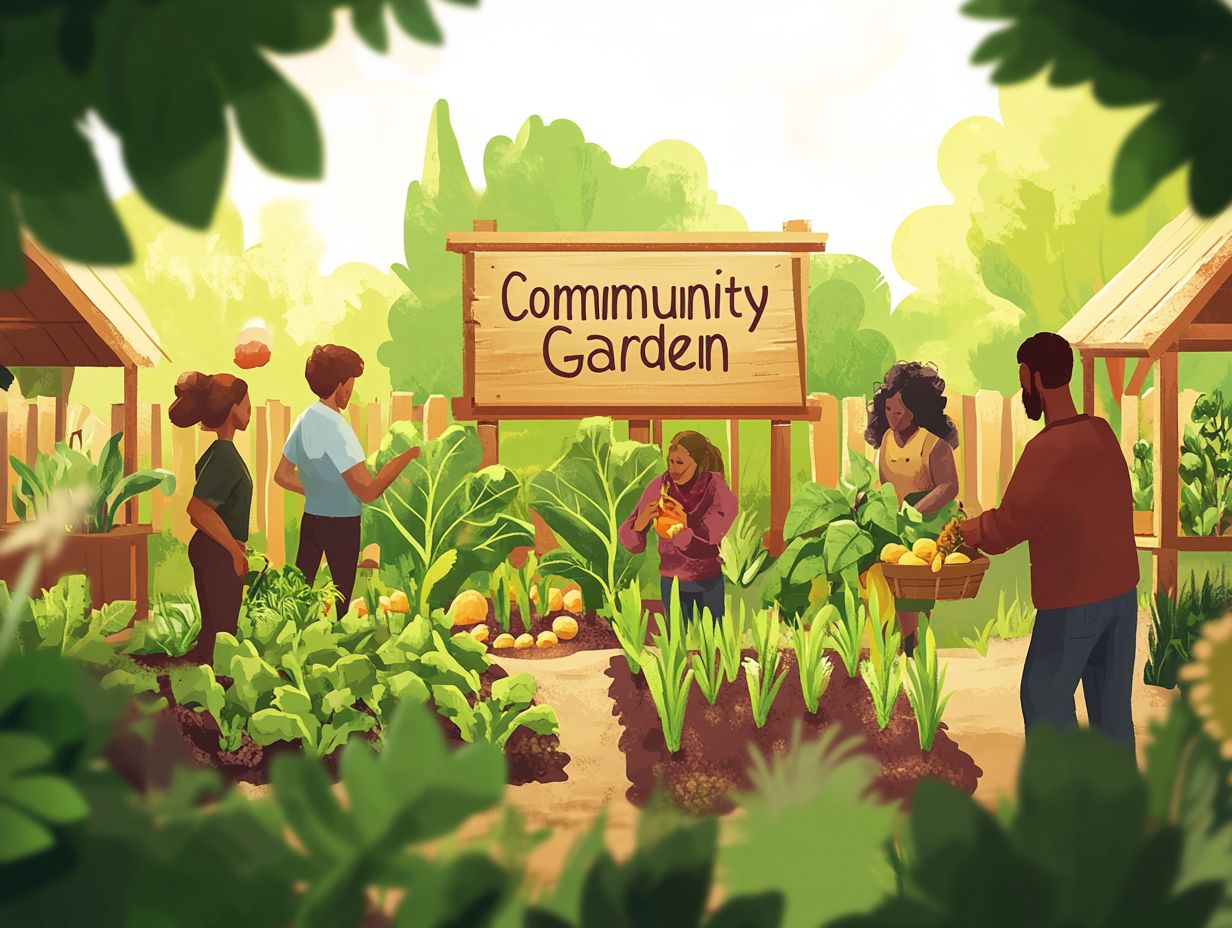
Community gardens allow individuals and families to grow their own fruits, vegetables, and herbs, leading to better nutrition and food security. They also foster social connections and a sense of belonging.
What environmental benefits do community gardens offer?
Community gardens improve air and water quality, reduce the urban heat island effect, and promote biodiversity. They serve as crucial green spaces in urban areas.
How can community gardens promote education and learning?
Community gardens are perfect for workshops, classes, and hands-on activities about gardening, nutrition, and sustainability. They also create opportunities for intergenerational learning and knowledge sharing.
How can individuals get involved with community gardens?
Individuals can participate in community gardens by volunteering, joining a garden group, or starting their own garden. They can also support local gardens through donations and by attending events.
Do community gardens have a positive impact on local economies?
Yes, community gardens positively impact local economies by providing affordable, healthy food options and promoting small-scale agriculture. They create job opportunities and attract visitors, boosting tourism.



